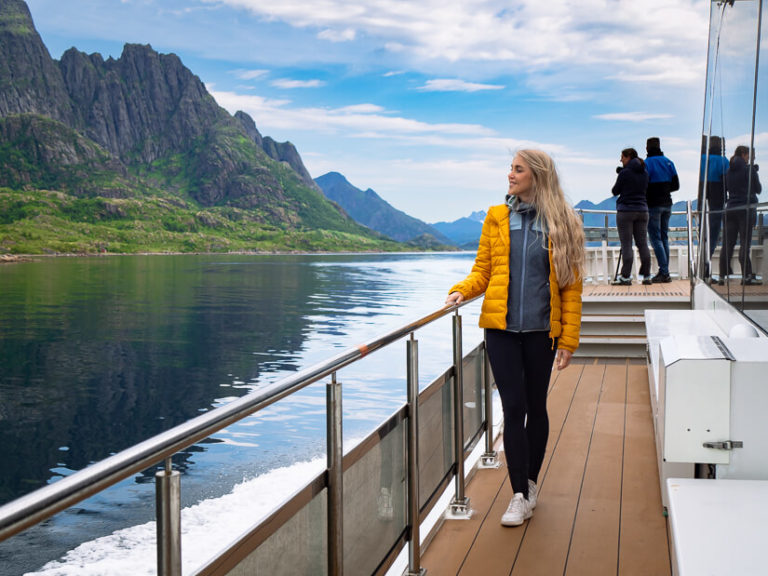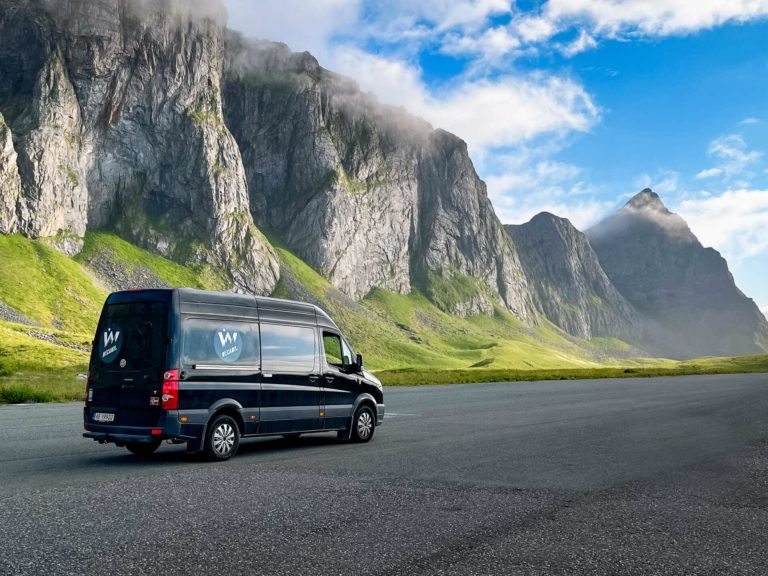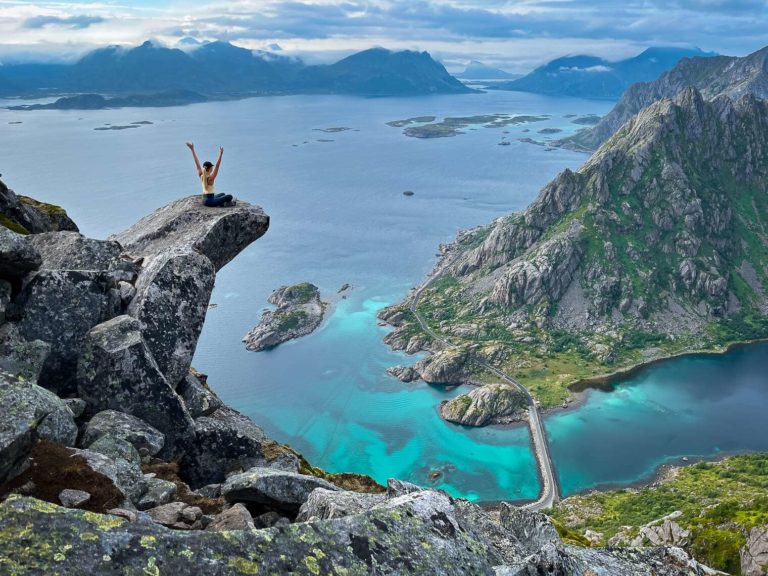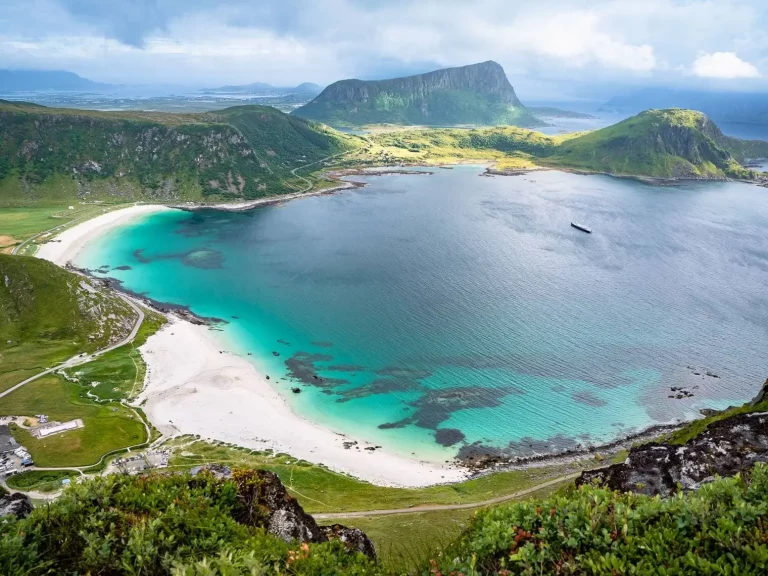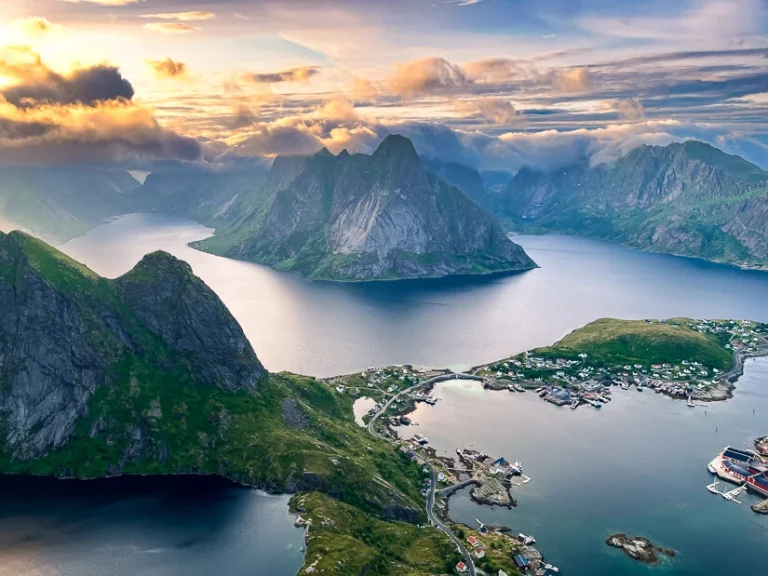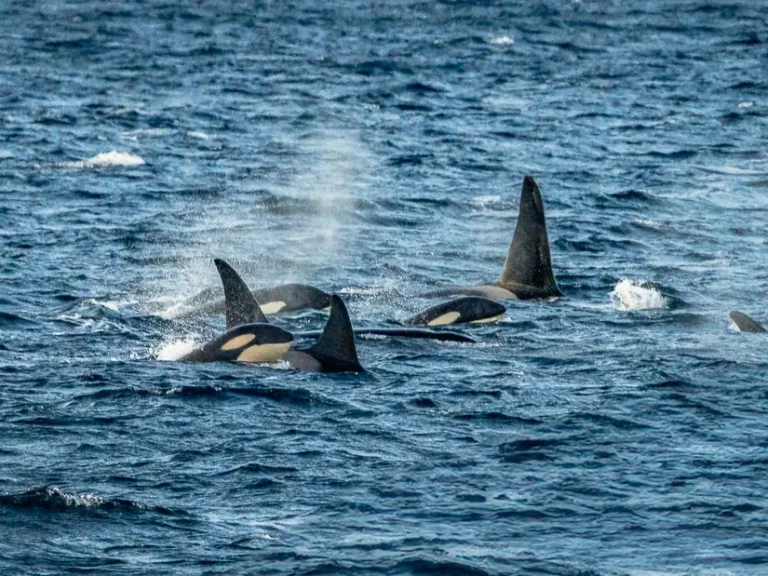The perfect Lofoten itinerary: 5 days on the Lofoten Islands
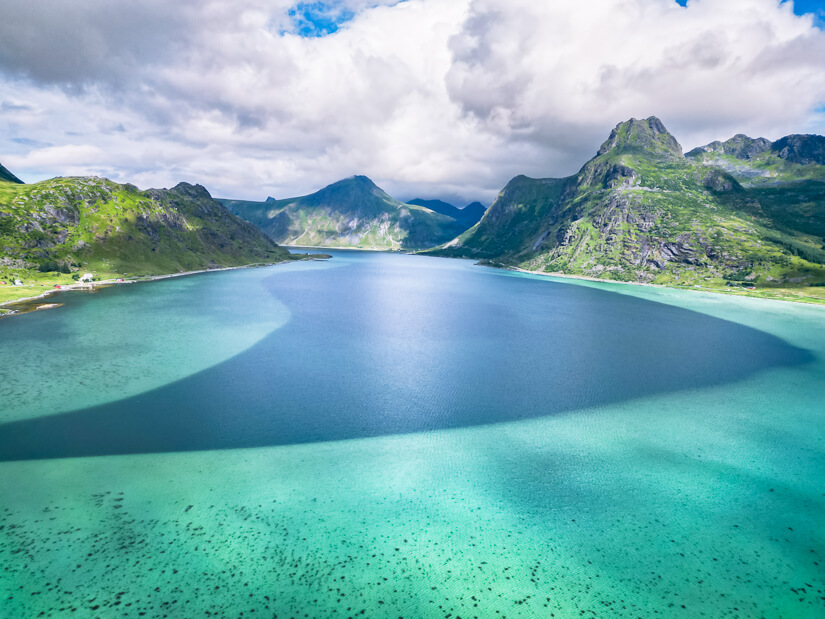
The Lofoten Islands in Northern Norway is a place of extraordinary natural beauty. It’s a wonderland of majestic mountains, deep blue fjords, white sand beaches and endless jaw-dropping views.
In this blog post, I’m sharing my 5-day Lofoten itinerary that showcases the most amazing natural attractions, hiking trails and charming fishing villages in the region. It’s one of the most beautiful road trips I’ve ever done and I’m convinced you’ll love it too!
At the end of this post, I’ve included a map where you can see the exact driving route for this Lofoten Islands itinerary and get a clear overview of where all the top sights are located. You’ll also find my recommendations on what to do if you have more than 5 days in Lofoten as well as my tips on how to get to Lofoten and the best time to visit the region.
Disclosure: This article contains affiliate links from which I may make a commission at no additional cost to you if you make a purchase.
Getting around the Lofoten Islands
The best way to get around Lofoten is by car. Although there is a public bus system, you’d waste a lot of time waiting for the buses and it would be difficult to reach the more remote parts of Lofoten. By having a rental car, you’ll have the freedom to explore more places and travel on your own schedule.
Driving in Lofoten is generally pretty easy and the mesmerizing views make it a fantastic experience in itself. The roads are well-maintained but some are quite narrow so you have to be a bit careful, especially in the summer when there’s more traffic. Lofoten’s main road E10 is a larger road, whereas the side roads are smaller.
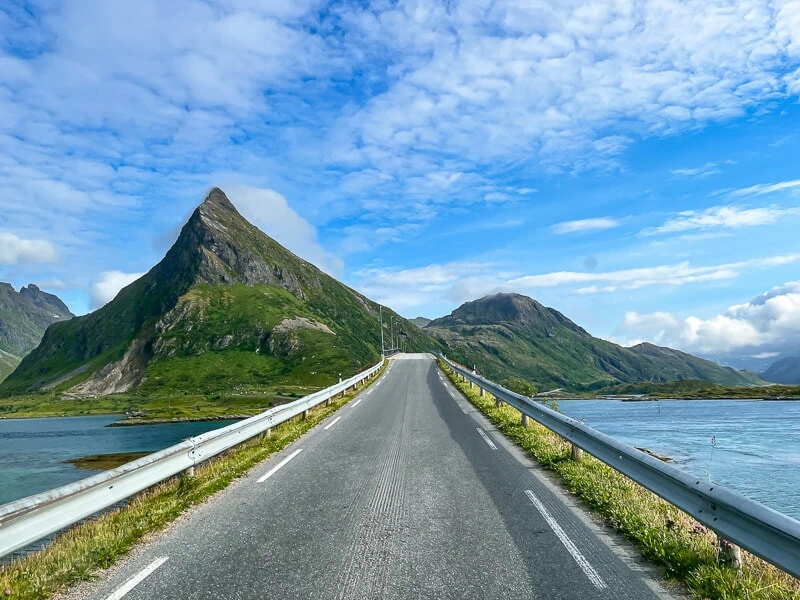
For our Lofoten road trip, we rented a campervan in the city of Tromsø and also visited the spectacular lesser-known Senja Island on the way to Lofoten. We rented the van from a Norwegian company called Wecamp and were really happy with it. For more details about the van and what it was like to travel with this setup, read my post about traveling Norway by campervan.
If you plan to visit Lofoten in the summer like we did, book your rental car or van well in advance as they tend to get sold out pretty quickly.
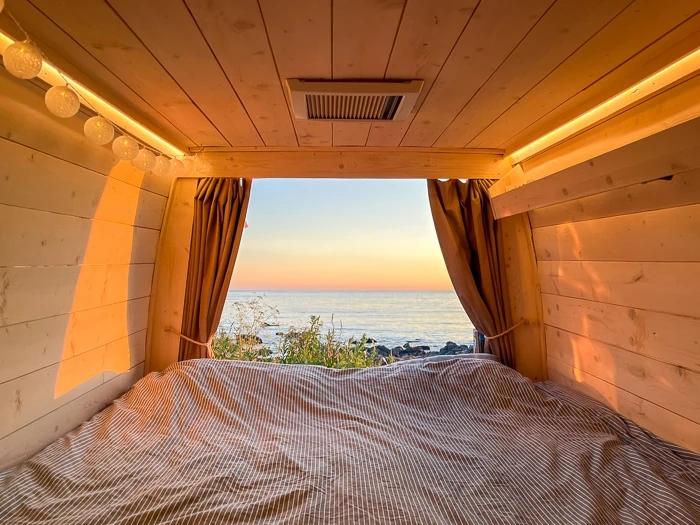
Lofoten itinerary: How to spend 5 days in Lofoten
This Lofoten Islands itinerary starts in the town of Svolvær in the eastern part of Lofoten and continues southwest over 5 days. It takes you all the way until almost the end of the Lofoten archipelago and then ends back at Svolvær. The total driving distance is around 350km (217 mi).
Since we explored the Lofoten Islands with a campervan, we didn’t stay in any hotels but if camping is not your thing, I’ve also listed the best hotels for different budget levels for each of the days in this itinerary.
Day 1: Svolvær, Trollfjord & Torsketunga
Svolvær is the largest town on the Lofoten Islands and is known as the gateway to Lofoten. You can get there either by flying, taking the ferry or driving from the mainland. I will share more details about getting to Lofoten at the end of this blog post.
Surrounded by pointy mountains, the town of Svolvær has a lovely harborfront with restaurants, souvenir shops and various tour operators. The main reason I recommend going to Svolvær though is to do the Silent Cruise to Trollfjord.
On this 3.5-hour cruise, you’ll be sailing onboard a hybrid-electric catamaran past spectacular coastal landscapes before arriving at the postcard-perfect Trollfjord. For more photos and details on what to expect on this beautiful cruise, read my Silent Trollfjord Cruise blog post.
You can book the tickets for the cruise online at Brim Explorer (the company that runs the cruise). If you use my discount code ‘smoothescape’, you can get 5% off your booking.
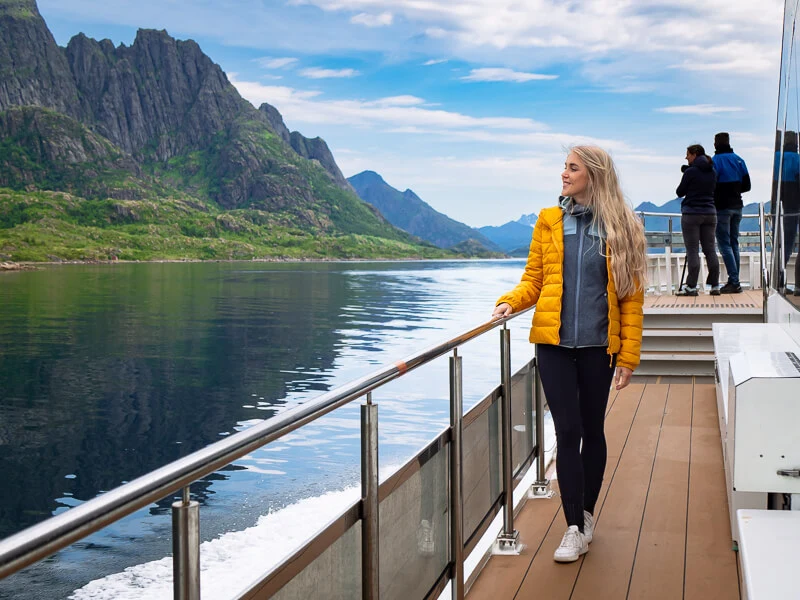
If you prefer something a bit more adventurous, you might want to take this 2-hour Sea Eagle Safari tour on a RIB boat instead.
After visiting Svolvær, drive west along E10, the main road of Lofoten. Stop at Rørvik Beach to swim in its clear tropical-looking water, visit the quaint fishing village of Henningsvær and do the nearby Festvågtind-Torsketunga hike – one of my favorite hikes in Lofoten.
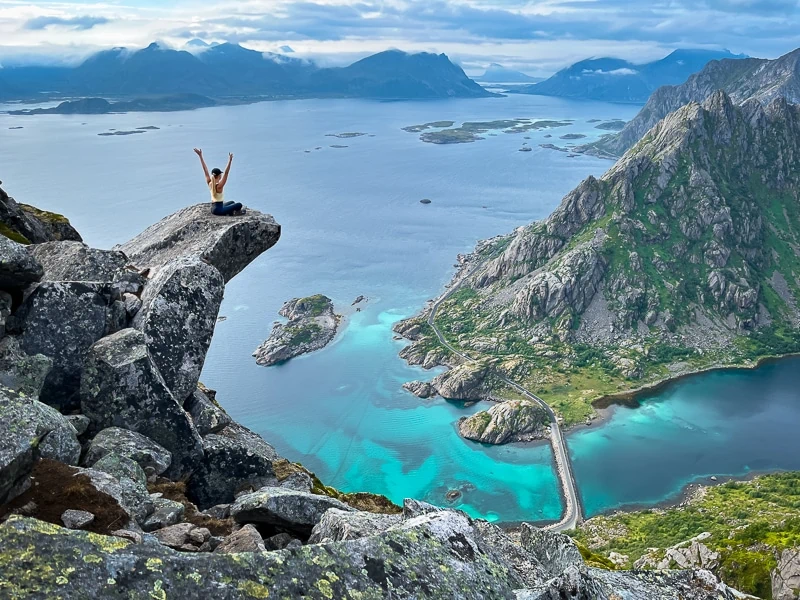
If you’re in Lofoten during the Midnight Sun period (approximately from May 27 to July 17), round off your day with a visit to Gimsøy Beach on the northern coast of Lofoten. As the beach faces north, it’s an excellent place for watching the Midnight Sun.
Where to stay
BUDGET: FURU Hostel & Café
A cozy lakeside hostel with both dorms and private rooms, a sauna and a cafe.
MID-RANGE: Tobiasbrygga
Stylish seaside apartments with rustic charm in Henningsvær.
Day 2: Eggum Beach, Haukland Beach & Nusfjord
Start the second day of your Lofoten itinerary with a visit to the tiny coastal village of Eggum to see its gorgeous white sand beach and wander along the scenic coastline.
Eggum Beach had the clearest water we saw anywhere in Lofoten. It’s a wonderful place for a refreshing morning dip if the weather allows it. Here you can also take a guided kayaking tour to explore the fjords and islets along the coast. For more details on Eggum, read my guide to the best beaches in Lofoten.
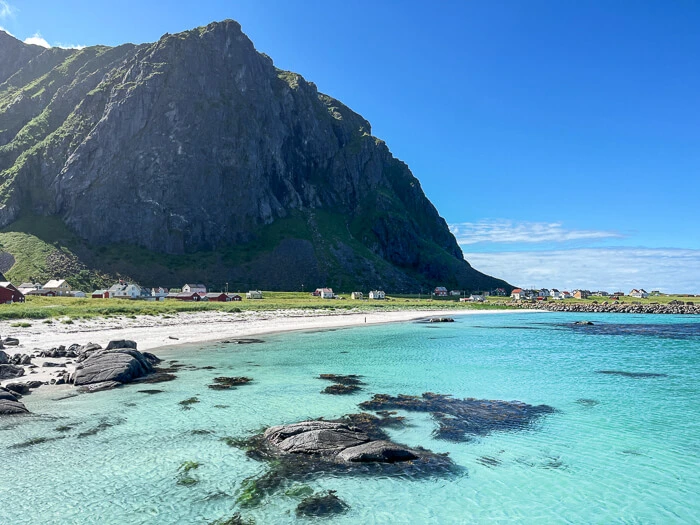
Next, drive to Haukland Beach, another stunningly beautiful beach in Lofoten. The water here is such a vibrant shade of blue and the sand so white that you could easily think you’re somewhere tropical.
Haukland Beach is also the starting point of the hiking trail to the peak of Mannen (400m/1312 ft), one of the most famous hikes in Lofoten. It takes just one hour to get to the peak, where you get a breathtaking view of the beach below.
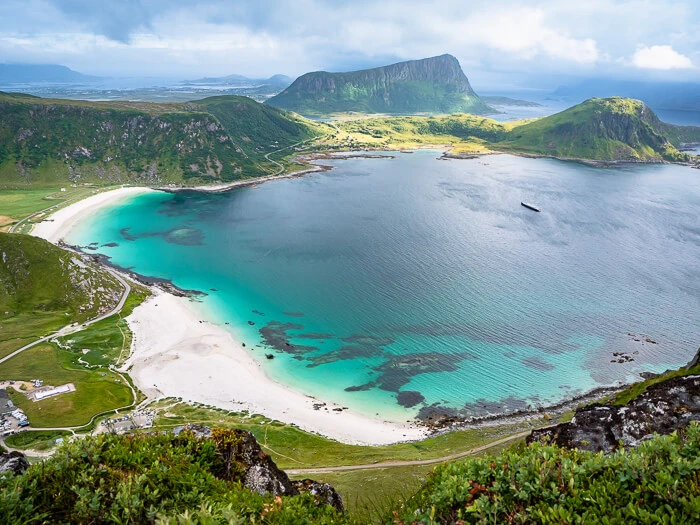
Finish the day with a visit to Nusfjord, a well-preserved historical fishing village on the edge of a small fjord. With its traditional architecture and fishermen’s cabins known as rorbuer, this place is like an open-air museum.
To enter the village of Nusfjord, you have to pay a fee of 100 NOK, unless you’re staying at a hotel in the village. If you don’t want to pay, you can still see Nusfjord from a free viewpoint above the village.
Where to stay
MID-RANGE: Ramberg Gjestegård
Cozy cabins with a kitchenette and a sea view, located on the idyllic Ramberg Beach.
LUXURY: Nusfjord Arctic Resort
A historic property with beautifully restored fishermen’s cabins, an onsite restaurant and a hot tub with views of the fjord.
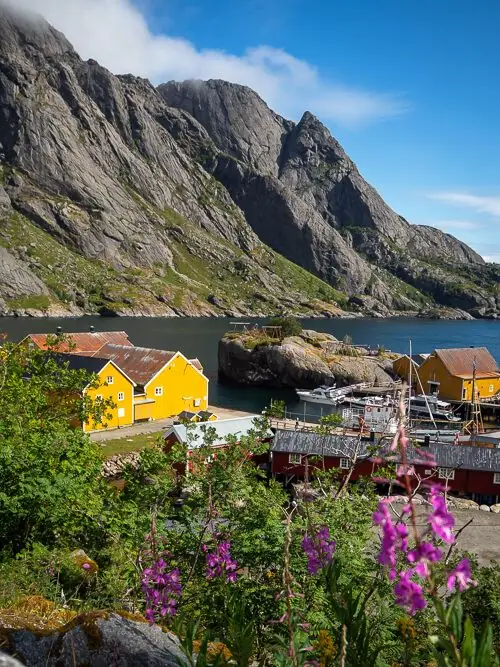
Day 3: Surfing, Ramberg Beach & Reinebringen
Kick off the third day with some Arctic surfing – a once-in-a-lifetime experience! You can rent surf gear or join a surfing class at Lofoten Beach Camp on Skagsanden Beach. This beach is ideal for beginner surfers since there are no dangerous currents or rocks. They also have SUP boards and kayaks for rent.
We went surfing here during our visit in July and it was definitely one of the highlights of my Lofoten itinerary. If you’re worried about the cold water, you really shouldn’t be! The head-to-toe wetsuits will keep you totally warm.
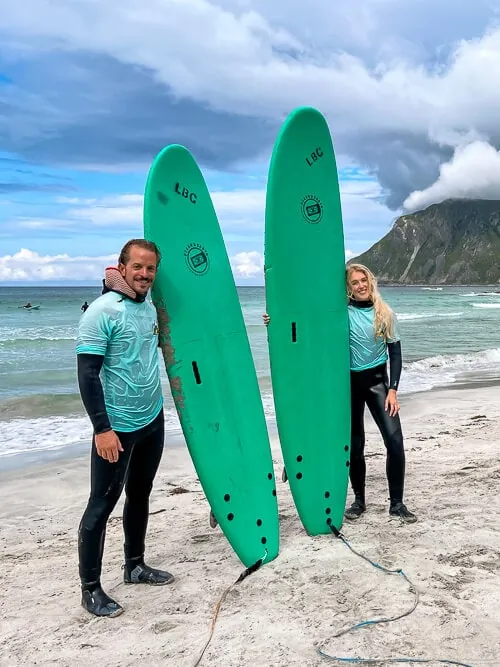
After that, it’s time to continue your Lofoten road trip and head further south along the E10. Soon you’ll reach the beautiful Ramberg Beach with its long strip of white sand and turquoise sea. It’s worth making a stop here to go for a stroll along the beach or go for a swim in case you didn’t get enough of these Arctic waters yet.
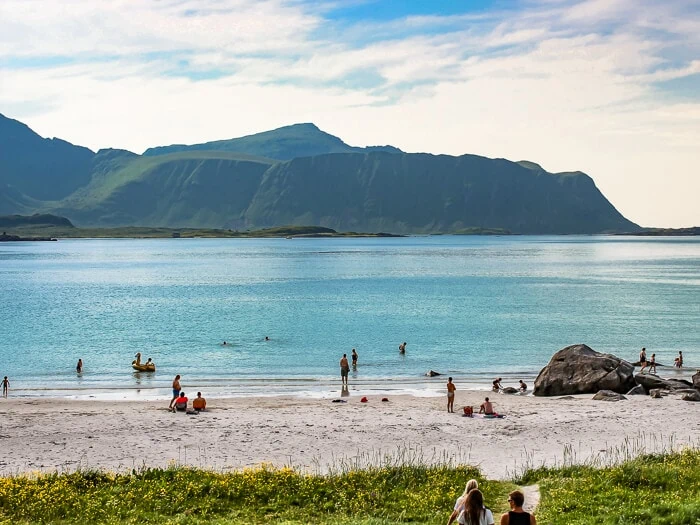
In the afternoon, visit the village of Reine. Tucked between dramatic mountains and fjords, Reine is known as the most scenic village in Lofoten. Because of that, it also gets very crowded in the summer.
Another reason you should visit Reine is to hike the iconic Reinebringen trail – by far the most famous hike on the Lofoten Islands. This short but steep trail takes you to the summit of Reinebringen where you’ll be rewarded with an incredible view of Reinefjord and the pointy mountains around it. If you’re visiting in the summer, I recommend doing this hike in the evening to avoid crowds.
Be sure to read my detailed guide to hiking Reinebringen to know where to find the trailhead, what to expect and what to bring.
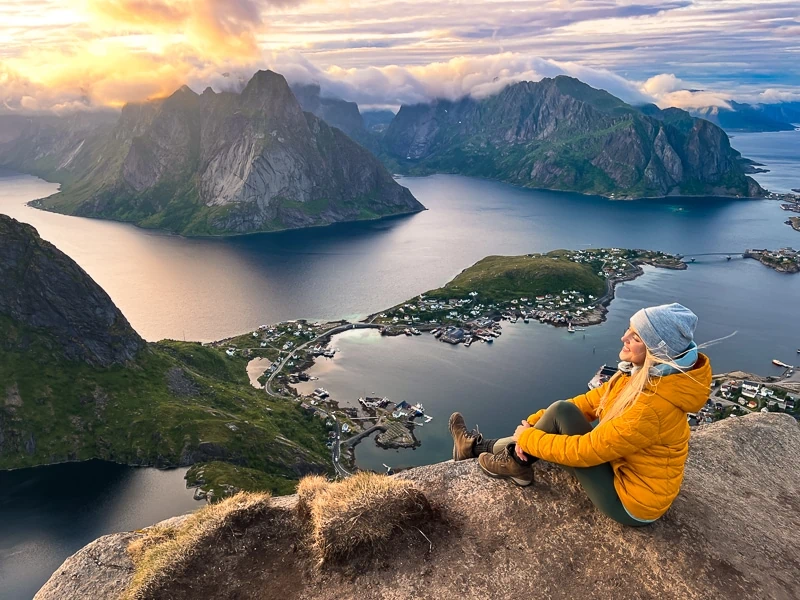
Where to stay
Spend the next two nights in or near the village of Reine.
MID-RANGE: Sakrisøy Gjestegård
A charming renovated manor house from 1880; there’s a shared kitchen, a garden and rooms with views of the sea and the mountains.
LUXURY: Reine Rorbuer
Stay in one of their traditional fishermen’s huts that has been converted into a cozy rustic cabin – a unique experience in Lofoten.
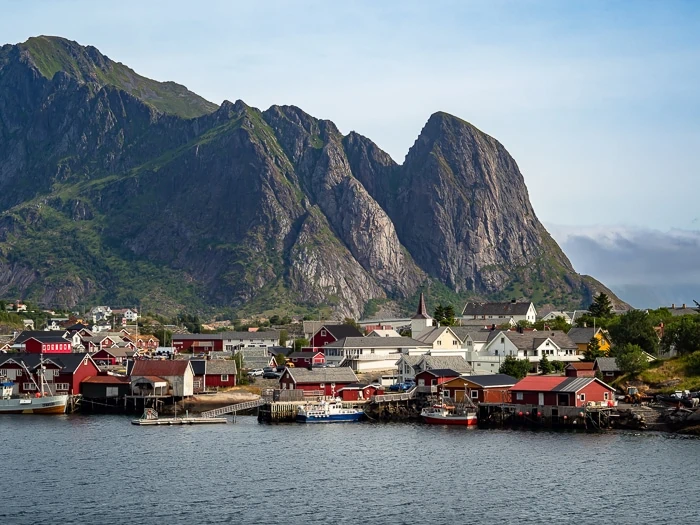
Day 4: Day trip to Værøy island
The 4th day of this Lofoten Islands road trip is all about exploring Værøy, one of the furthermost islands of the Lofoten archipelago.
To get to this tiny remote island, you have to take a ferry from Moskenes port in the morning. The ferry is free of charge for both cars and pedestrians and the journey takes a bit over an hour. Check the ferry schedule and start queueing several hours before the departure if you’re visiting Lofoten in summer to be sure you get a spot.
A must-do activity on Værøy is the hike to the Håen viewpoint. It’s an easy 3.2km (2 mi) hike to the top of a mountain peak offering a surreal view of the otherworldly landscape of western Værøy. I’d even say that this was my favorite view in all of Lofoten.
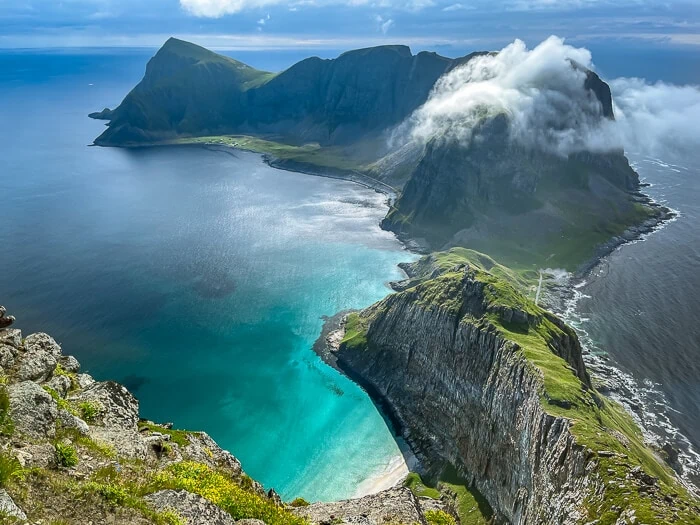
Besides the hike, you can also take a boat to the beautiful secluded Puinn Sand Beach or do a boat tour to see puffins. I also recommend going for a drive along the eastern coast of the island all the way until you reach the end of the road and see an abandoned airstrip. It’s a very scenic drive with amazing views along the way.
In the evening, take the ferry back to Moskenes. If you’re visiting in the summer, get to the port at least two hours in advance to secure your spot.
Note: Outside of the summer months you might not be able to visit Værøy on a day trip because there are fewer ferry departures.
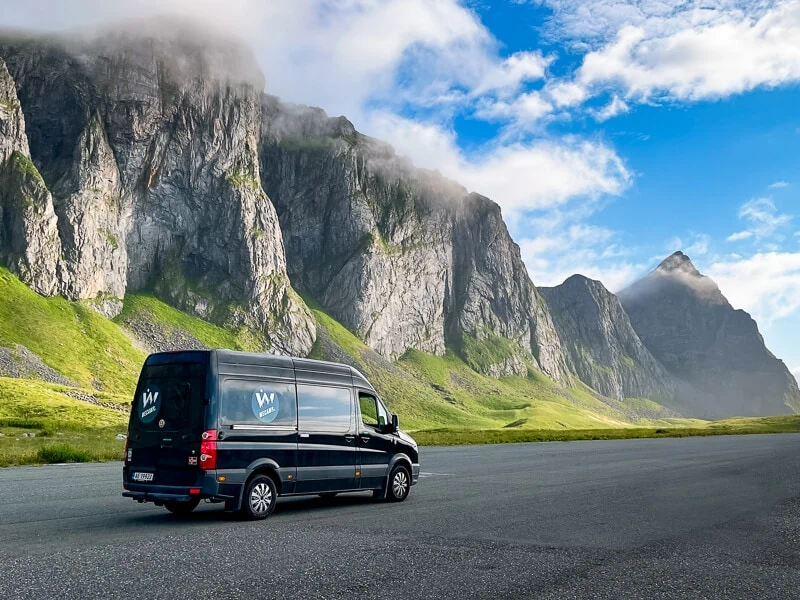
Where to stay
Spend another night in the hotel you stayed at the night before. My recommendations are Sakrisøy Gjestegård and Reine Rorbuer.
Day 5: Kvalvika Beach & Ryten hike
On the final day of your Lofoten trip, do the hike to Kvalvika Beach. Hidden between steep granite mountains, this spectacular isolated beach is considered one of the best beaches in Lofoten.
To get to the trailhead, drive over the scenic Fredvangskrysset bridges to Innersand village. From there, the hike to the beach takes about 1.5 hours. For a fantastic birds-eye view of Kvalvika Beach, you should also do the detour to the peak of Ryten that towers over the beach. This adds another hour or two to the hike.
After that, it’s time to wrap up your 5-day Lofoten itinerary and start heading back towards Svolvær. The drive should take about two hours.
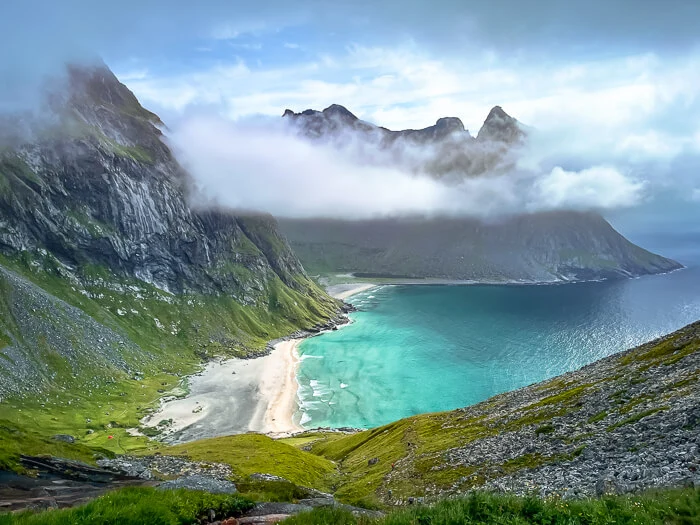
Lofoten Islands itinerary map
On the interactive map below, I’ve marked the exact driving route of this itinerary for Lofoten as well as the points of interest and hotels I mentioned in this post. Click on the top left corner of the map for more details.
Other places to add to your Lofoten itinerary
If you can spend more than 5 days in Lofoten or you’re simply looking to add other stops to your itinerary, here are some places and activities that might interest you:
- Visit Lofotr Viking Museum – In this museum, you can travel 1000 years back in time and see how the Vikings lived. It’s the perfect place to visit on a rainy day.
- Go horseback riding – Explore the beautiful coastline of Lofoten on this guided horse riding tour with Icelandic horses.
- Explore Å – Located on the southern end of the Lofoten archipelago, the village called Å is the furthest point you can drive to in Lofoten (without taking a ferry). Here you’ll find both the Norwegian Fishing Village Museum and the Stockfish Museum.
- Take a Midnight Sun kayaking tour – On this 3-hour kayak tour in Eggum, you can witness the Midnight Sun phenomenon from the water.
- Go to a sauna – It’s the best way to warm up on a chilly day. You can find public saunas in many places in Lofoten. Some examples are Hamnøy Sauna, Hov Gård Sauna and LYST Lofoten Sauna.
- Chase the Northern Lights – Between September and early April you can see the stunning Aurora Borealis in Lofoten. For the best chances of seeing them take a Northern Lights tour with an experienced guide.
Best time to visit the Lofoten Islands
The best time to do this Lofoten road trip is from mid-June to the end of September. In this period, the weather is the best, days are long and hiking trails are free of snow. July and August are the warmest but also the busiest months.
The Midnight Sun period in Lofoten lasts from May 27 to July 17. In this period, the sun never sets and there’s 24 hours of daylight each day. It’s a really unique experience.
Winters in Lofoten are cold and have only a few hours of daylight. During the Polar Night period, which lasts from early December to early January, the sun won’t rise above the horizon at all. It won’t be completely dark though during that time and in the middle of the day you can often see beautiful pastel colors of twilight in the sky.
Although visiting during the Arctic winter has its challenges, it’s definitely a special experience. We visited Tromso in the winter (which is even further north) and really enjoyed it.
From September to mid-April, you can see the Northern Lights in Lofoten.
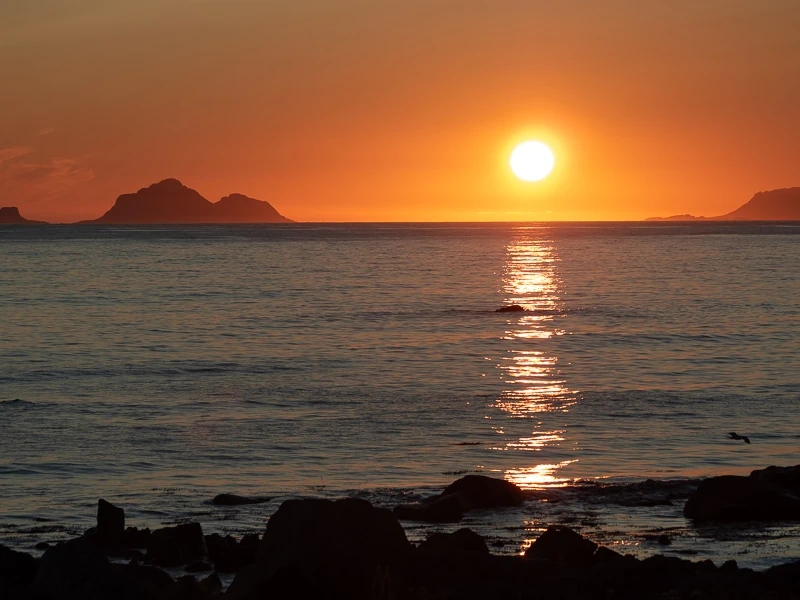
How to get to the Lofoten Islands
The best way to get to the Lofoten Islands is to fly to one of the airports in or around the archipelago. The two airports on the Lofoten Islands are Svolvær and Leknes. Other airports within a reasonable distance from Lofoten are Bodø, Narvik and Tromsø.
From Bodø, you can take a 3.5-hour express boat to Svolvær (see the schedule) or a 3-hour ferry to Moskenes (see the schedule) in Lofoten. From the other destinations, you can drive to Lofoten. From Tromsø it’s about a 6-hour drive and from Narvik it’s a 3-hour drive.
If you’re looking to rent a campervan for this Lofoten itinerary like we did, I recommend flying to Tromsø, Narvik or Bodø as there aren’t many campervan rental options on the Lofoten Islands.
Related post: Tromsø itinerary for 4 days
Lofoten itinerary: Final thoughts
I hope that this Lofoten Islands itinerary gave you some ideas for planning your own trip to this fantastic corner of Norway. It’s a destination that should be on every nature lover’s bucket list!
If you have any questions about this itinerary or about traveling in Lofoten, let me know in the comments.
For more tips and inspiration for planning your trip, check out my other Norway travel guides:
- Silent Trollfjord Cruise in Lofoten
- Best hiking trails in Lofoten
- Visiting Senja, an off-the-beaten-path island
- The most beautiful beaches in Lofoten
- How to travel by campervan in Norway
- Tips for hiking Reinebringen, Lofoten’s most famous hike
- How to spend 4 days in Tromso
Pin this Lofoten itinerary!
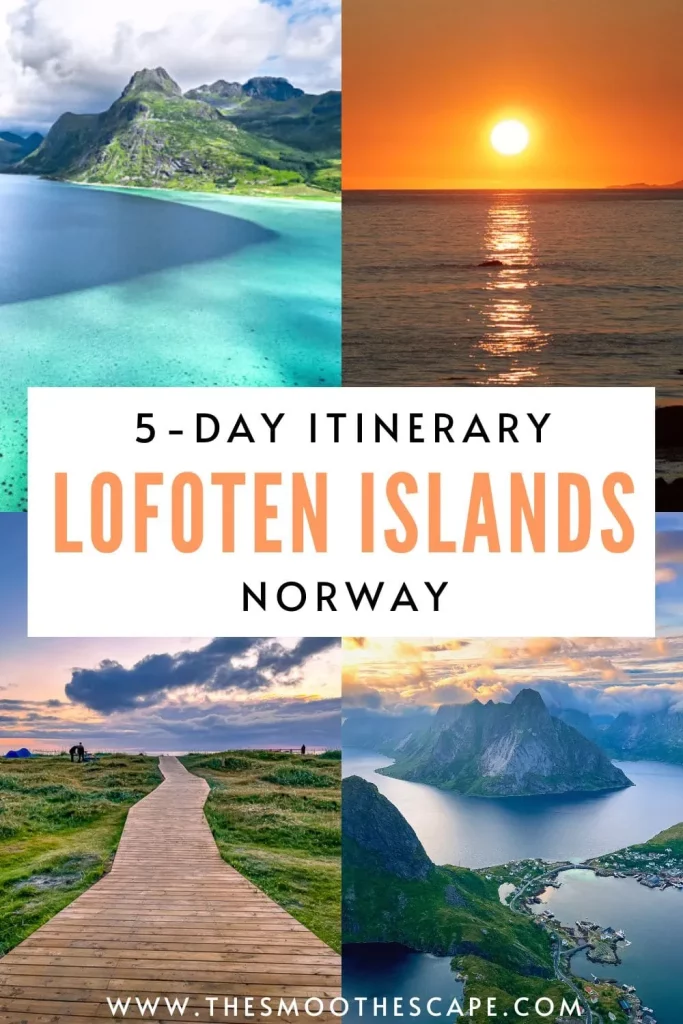
READ MORE:

